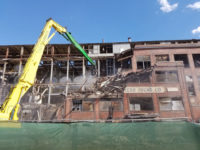Three problem projects may test the working relationship among California's Dept. of Transportation, Kiewit and elected officials. Tens of millions of dollars in payments ride on who is to be held responsible for delays and cost overruns on the new San Francisco-Oakland Bay Bridge, the expansion of the Interstate 405 Freeway in Los Angeles and the recently opened Devil's Slide Tunnel in San Mateo County.
U.S. Rep. Henry Waxman (D-Calif.) and other officials throughout the state want assurances that funds are not being wasted. Waxman sent a letter to the U.S. Dept. of Transportation requesting an investigation into the I-405 work.
The Los Angeles County Metropolitan Transportation Authority announced in late April that I-405 will open at least one year behind schedule and $100 million over budget because of problems with retaining walls, the discovery of unknown utilities under I-405's Sepulveda Pass and other problems. Relocating the utilities will involve a lengthy process.
The I-405 expansion was Caltrans' first design-build project. It provided funding and served as technical adviser.
Although Kiewit declined an interview request, the Omaha-based firm explained in an email that "incomplete" utility maps for the Sepulveda Pass caused some of the delays on I-405, which seemed to suggest a critique of the design guidance it had received from Caltrans. Separately, Kiewit is embroiled in a lawsuit in state court with the surety for a company called SSL. It provided material related to a mechanically stabilized earth wall and Kiewit claims the material was at fault for a major retaining wall that collapsed in 2011.
The Bay Bridge and the Devil's Slide Tunnel were traditional design-bid-build. Built through San Pedro Mountain along Highway 1 in San Mateo County, the Devil's Slide Tunnel opened in March, two years later than originally expected. The final cost of $439 million was $117 million over the original estimate, and Caltrans attributed the delays and costs mostly to erratic soil conditions.
Previous cost overruns and subsequent public outcry typically involved "enough blame to go around" and isn't limited to one particular person or party, says Tom Holsman, CEO of the Associated General Contractors of California.
The Bay Bridge may be a special case. Last March, work crews discovered problems with anchor-bolt rods on the bridge's eastern span. That part of the project was built and the anchor-bolt rods were installed under a joint venture of American Bridge and Fluor. A repair plan will cost $5 million to $10 million and the publicity surrounding the problem set the stage for news about other potential problems, this time involving the skyway on the eastern span, built by a Kiewit-led joint venture.
In recent weeks, the Fresno Bee revealed possible extensive trouble with corrosion protection in tendon sleeves on the main span, where Kiewit is the lead contractor in a joint venture
"With the [tendon] corrosion and broken bolts on the Bay Bridge, the materials would be sourced by" the responsible contractor for that part of the project, "but the process is reviewed stringently by Caltrans," notes Holsman. "They are not going to relinquish oversight of the general public's safety very readily, so they are intimately involved" in the methods and materials.
Consistent with Holsman's assessment, Kiewit said in a statement issued to the Fresno Bee that "at Caltrans' request, we protected the tendons with Vapor Phase Inhibitor Powder."
A Caltrans' spokesman struck a philosophical note. "Ultimately, all the funding partners bear the risk," including the sureties, says Mark Dinger. With tunnels, "you start digging, and you don't know what you are going to find. If there's a problem, we have to go back to the funding partners and decide whose responsibility it is." If one party isn't at fault, "we have to find a way to pony up the money."
Dinger added that Caltrans also has the option of withholding funds under a performance clause in its contracts. "If Caltrans feels that a contractor has not performed sufficiently, they simply don't get paid," he says.
This story was updated June 6 to reflect that the American Bridge-Fluor joint venture was the contractor involved with the anchor-bolt rod problems on the eastern span of the new Bay Bridge, not Kiewit, and that Kiewit had stated to the Fresno Bee that it had followed Caltrans' instructions on the tendon corrosion issue.
This story was additionally updated July 18 to reflect the fact that the retaining wall that collapsed was a mechanically stabilized earth wall, not a tieback system.



Post a comment to this article
Report Abusive Comment